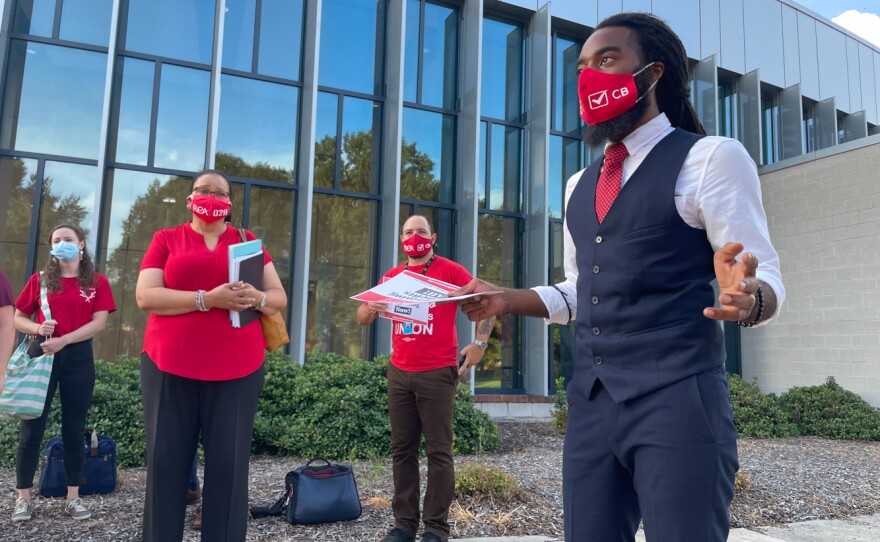A workgroup is meeting Monday night to discuss the legal implications of and concerns about a draft resolution that would allow Richmond Public Schools teachers to collectively bargain. In late September, three Richmond School Board members announced support for a collective bargaining resolution which was formally introduced in October.
Board members Kenya Gibson, Stephanie Rizzi, and Shonda Harris-Muhammed, who represent the third, fifth and sixth districts respectively, have spearheaded the resolution.
“The Commonwealth of Virginia has a fraught and storied history with organized labor, and its source is the same structure that has fought to defund our schools and our public sector — systemic racism,” a joint statement from Gibson and Rizzi about the resolution reads.
“Most notably, in 1946, segregationist Governor Bill Tuck ushered in a new era of hostility when he threatened to conscript workers of Virginia Electric and Power Company [now known as Dominion Energy] and force them into labor because they were striking for fair working conditions,” the statement reads. “Governor Tuck’s machinations successfully broke their strike. After this loss, he passed so-called ‘right-to-work’ laws to perpetually crush Virginians unionist efforts.”
Instead of taking a vote on the resolution in October, the school board formed an ad hoc committee, including Rizzi and Harris-Muhammed, to review language in the resolution before coming back to the full board with recommendations.
The workgroup also includes the district’s attorney Jonnell Lily, an attorney from the Virginia Education Association, representatives from the Richmond Education Association, district staff and a few RPS teachers.
Lilly provided notes about the draft resolution for discussion during Monday’s meeting, including the scope of collective bargaining, potential cost-sharing between the district and partner organizations, methods of bargaining, and more. The committee plans to present a revised resolution to the school board for a vote next month.
Rizzi is hopeful the full school board will be supportive of the measure once the committee’s review is complete. She said she knows from personal experience as a former teacher what it feels like to not feel like you have a lot of power over your working conditions.
“As a teacher, I have gone out for the summer and come back and found out that I'm teaching a totally new grade level in a totally new room, and no one called me, no one told me,” Rizzi said. “These are things that happen to teachers pretty regularly, and it's frustrating…As a teacher, you don't have a lot of control over working conditions at all. And this is a step toward putting some of that power in the hands of the people who are our most vital workers.”
A new state law passed in 2020 lifted a 44-year ban on collective bargaining for local employees in the state. The law took effect May 1 and permits educators to negotiate contracts. However, state law still prohibits strikes from public employees.
Darrell Turner, a preschool teacher and vice president of the Richmond Education Association, says REA does not plan to strike – nor does it support teacher strikes. He’s part of the workgroup and is excited to work on a resolution he says benefits the entire RPS community, not just teachers.
“Ultimately, we want what's best for our students,” Turner said. “And making sure that the staff have adequate say, making sure that they have strong working conditions, making sure that their voices and their opinions feel valued, that's going to go a long way to benefit the students.”
Turner says a big goal of the collective bargaining process is to empower teachers and RPS staff members to speak up about concerns they have and about changes that need to be made.
“Who better to speak about the conditions of what's going on in the buildings than the actual folks who are on the ground every day?” Turner said. “In a way we are the school systems, you know, experts on what's going on in the schools.”
Personally, Turner would like to see teacher contracts more clearly define what “other duties” entail to prevent miscommunication and misunderstandings between district officials and teachers.
“It's not that we, educators, don't want to do those other assigned duties, because they're essential for keeping our school running,” Turner said. “But we want to have them clearly defined so that that way, we know what's expected of us.”
Karen Taylor, a second-grade teacher at Holton Elementary, showed up to the Oct. 4 school board meeting to support the collective bargaining effort. Taylor says working conditions are top of mind for her; she says two classes in her grade level had to be combined because the school was short a teacher.
“We're short staffed, and teachers are kind of taking the brunt of it,” Taylor said. “We have the kids coming in earlier than they normally would during contract time because we need to make sure they have breakfast. And then we're going out without lunches, very often not having preps. And then when we do have preps we're having mandatory meetings during preps, which is not what our prep is supposed to be according to Virginia state law. It's really hard. People are exhausted. And this is all on top of all the COVID precautions and the other stress. And I think we feel like we're not being heard.”
James Fedderman, president of the Virginia Education Association, says similar discussions are happening in districts across Virginia. He says the discussions are important now more than ever.
“COVID has certainly revealed that a lot of the opportunities to bring stakeholders to the table haven’t happened so much. And collective bargaining is just one guarantee that that seat at the table is never lost,” Fedderman said. “When negotiating contracts, it's slow and steady work. But it's all part of the process.”
Another RPS collective bargaining committee meeting is scheduled for Dec. 2, and the group plans to present a revised resolution to the school board on Dec. 6.





